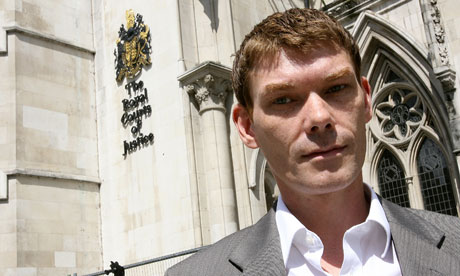 Gary McKinnon outside the Royal Courts of Justice in London. Photograph: John D Mchugh/AFP/Getty Images
Gary McKinnon outside the Royal Courts of Justice in London. Photograph: John D Mchugh/AFP/Getty ImagesA final decision on whether computer hacker Gary McKinnon is to be extradited to the United States is now imminent. Behind the scenes, a battle is apparently under way between politicians and officials over what the outcome should be. There may be much else to occupy the government at the moment, but it is vital that this matter of principle is not sidelined.
More than a decade has passed since a self-styled computer nerd, working out of a bedroom in north London, started trawling through the computer systems of Nasa and the US defence department in search of information about UFOs. He left behind some rude messages about the systems' sloppy security and was arrested by British police. In all that time, no evidence has been advanced by the US prosecuting authorities that any harm – beyond the cost of installing better computer security – has resulted from McKinnon's activities.
Had he been prosecuted in the UK, as he should have been at the time, the whole matter would have been forgotten. McKinnon, who has since been diagnosed with Asperger's syndrome, would have served a mild, possibly suspended, sentence. As it is, his case now presents the government with a test of ethics.
"Gary McKinnon has been hung out to dry by a British government desperate to appease its American counterparts" – the words of Nick Clegg, while still in opposition. "Gary McKinnon is a vulnerable young man and I see no compassion in sending him thousands of miles away from his home and loved ones to stand trial. If he has questions to answer, there is a clear argument to be made that he should answer them in a British court," is what David Cameron said before he became prime minister. Fine words. They should both now make clear to home secretary Theresa May that she would have their full and public backing, despite what her officials may tell her, if she announces that McKinnon is not to be hauled off to the US.
The failure to deal with the case has already taken its toll on him, and the latest psychiatric assessment, made in April this year, places him at "extreme" risk of suicide if extradited. "Gary has lost 10 years of his youth," his mother, Janis, said on Monday. "A young man who cycled, swam, composed music and sang, now sits in the dark with his cats and never wants to see or speak to anyone."
Cameron, to his credit, has raised the case with President Obama on at least two occasions. The latter indicated that he would be content with whatever decision the British government were to make. It has long been clear that there is little real clamour in the US for McKinnon to be sent there for trial. Whether that relaxed attitude would change if Mitt Romney was to win the presidential election in November is another matter. For this reason, it is important that the British government acts now.
McKinnon's MP, David Burrowes, has hit on a novel way to resolve the issue by attaching it to the diamond jubilee celebrations. He wants the Queen to consider using her prerogative of mercy to ensure justice is served. The government should consider that doing the right thing will have only favourable consequences for them. A decision to allow the extradition would haunt them all the way, through trials and imprisonment, to the next election. The case of Gary McKinnon is a clear instance of a vulnerable individual being targeted by an overwhelmingly powerful force. With this in mind, it is time for Theresa May to reassert the rights of the citizen and to stand up to the bullying threats from the other side of the Atlantic.
http://www.guardian.co.uk/commentisfree/2012/jun/04/gary-mckinnon-extradition...

No comments:
Post a Comment